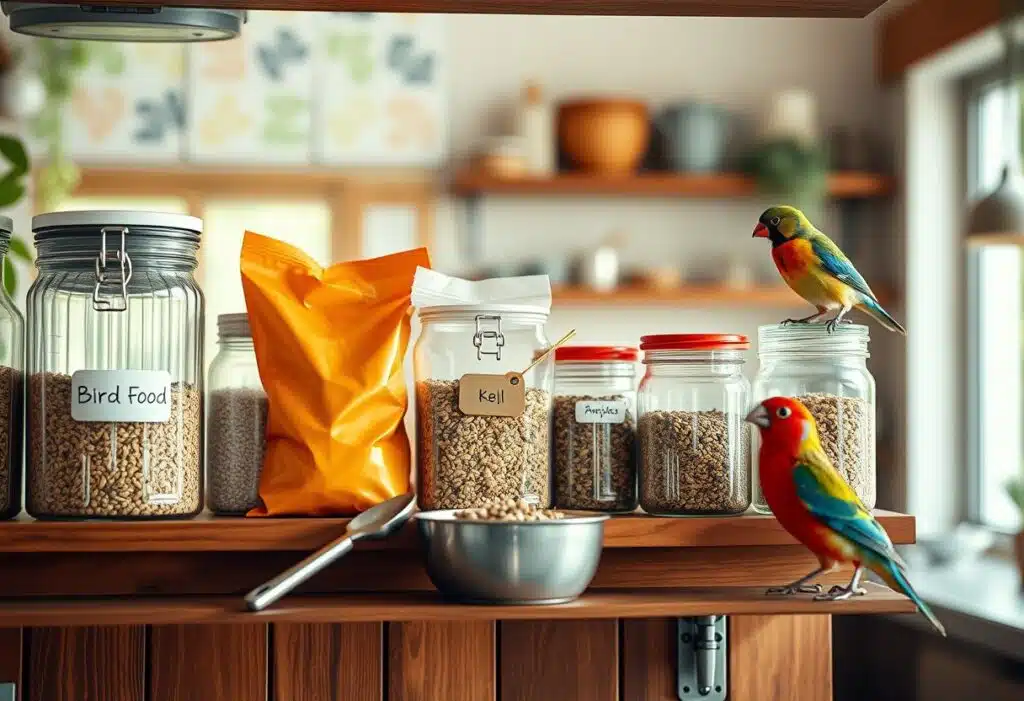How to Store Your Bird Food and Keep Birdseed Fresh for Wild Birds
Freshness is key when it comes to keeping your bird food safe and appealing for wild birds. By learning how to properly store your birdseed, you can ensure that your backyard birds have access to fresh and healthy meals while avoiding issues with mold, pests, and spoilage. This guide will walk you through the best practices for securing your bird food, including the right storage containers, suitable locations, and tips for maintaining quality. With these simple steps, you’ll create a reliable supply of nutritious seeds that keep your bird feeders filled and bustling with activity!

Key Takeaways:
- Store Your Birdseed in a Cool and Dark Place: Keeping your bird food in a shaded area helps prevent it from going bad. Use a metal container or large plastic container with a tight-fitting lid to keep out pests like rodents and moths.
- Use Airtight Storage Solutions: An air-tight storage container is important to keep your birdseed fresh and healthy. This also reduces the chance of it getting moldy or infested with weevils. Consider using galvanized metal cans or seed storage bags for this purpose.
- Check and Clean Your Bird Feeders Regularly: Make sure to clean your bird feeders to prevent spoiled food and moldy thistle seed. Refill the feeders after rainy days to keep the food safe for wild birds. Cleaning them with a mixture of 9 parts water and 1 part bleach helps maintain a healthy feeding environment.
How to Choose Quality Bird Seed
Before you invest in bird food, it’s important to select quality bird seed to ensure your feathered friends enjoy nutritious meals. The right choice not only keeps your birds healthy but also makes bird feeding more enjoyable for you. For helpful Tips for Storing Birdseed, consider your options wisely.
Importance of Inspecting Seed Bags
Any seasoned bird feeder knows that inspecting seed bags before purchase is crucial. Dusty bags may indicate that the bird food has been sitting on the shelf too long and could be close to expiration. Choosing clean, well-sealed bags will help you avoid seeds that are old or possibly contaminated.
Opting for Seeds With Hulls
For a freshness advantage, opt for seeds with hulls, such as black oil sunflower seeds. These seeds tend to stay fresh longer, particularly during warmer months, making them a smart choice for your feeders. Hulls not only protect the seed inside but also provide extra texture for your birds as they chow down.
The hulls on these seeds play a vital role in maintaining freshness. They act as a protective barrier, preventing moisture from reaching the fresh seed inside. As a result, seeds with hulls are less likely to spoil in humid conditions or during periods of slow bird activity. In contrast, unhusked seeds are more vulnerable to mold and pests. By choosing seeds with hulls, you can confidently keep your bird feeders filled with nutritious food that your wild birds can consume without worry.
Choosing the right bird seed is the foundation for successful backyard bird feeding. It ensures a steady supply of fresh and healthy food, allowing your birds to thrive while also keeping your feeding environment clean and organized.

Best Storage Practices for Bird Seed
Some of the best storage practices for bird seed can help you ensure your bird food stays fresh and healthy for wild birds. To learn more about proper storage, check out this guide on How to Store Your Birdseed to Keep it Fresh. Following these methods will help you maintain a steady and nutritious supply for your backyard visitors.
Keeping It Cool and Dark
For optimal seed longevity, be sure to keep your bird seed in a cool, dark place. Storing it in areas like a basement or indoor closet protects it from heat and light, which can accelerate spoilage. When temperatures rise, this simple tip will help maintain your seed’s freshness for much longer.
Utilizing Airtight Containers
For effective storage, use airtight containers to keep your bird seed safe from pests and mold. Airtight seals prevent moisture and air from festering inside, ensuring your bird food remains fresh. This is crucial because once insects, like weevils, infest your seeds, you often lose the entire container. This approach to storage not only keeps pests out but also allows you to buy larger amounts of seeds without worrying about spoilage. Consider investing in metal cans with tight-fitting lids or thick plastic containers that are rodent-proof. Make sure your storage solution can accommodate the different types of bird food you use, such as suet cakes or sunflower seeds. Doing so will guarantee that your supply of birdseed is always available and remains healthy and nutritious for your wild birds. Make it a habit to check for freshness regularly to ensure your feathery friends always get the best!
Tips for Maintaining Freshness
Despite your best efforts, bird food can spoil if not properly maintained. Following these crucial tips can keep your birdseed fresh and your backyard birds happy:
- Store your birdseed in an airtight container to prevent moisture and pests.
- Keep your bird feeders clean and regularly maintained, especially during peak seasons.
- Monitor the seed condition before refilling your feeders.
- Use fresh types of seed and avoid those that smell bad or appear moldy.
- Store bird seed in a cool, dark place to extend its lifespan.
Any of these practices will help ensure your seed remains nutritious and safe for the wild birds visiting your backyard.
Freezing Seed and Suet
Suet cakes can spoil quickly, especially in warm weather. To prevent this, consider freezing your suet and birdseed. By placing them in smaller portions in freezer-safe storage bags, you can prolong their freshness. This way, you can use just what you need without worrying about spoilage.
Cleaning Bird Feeders Regularly
If you want to keep your bird feeders welcoming and safe for wild birds, make it a habit to clean them often. Regular cleaning helps eliminate mold and bacteria that can harm your feathered friends. Aim to clean your bird feeders at least once with every season change, and do it more frequently for feeders attracting hummingbirds.
Regularly washing your bird feeders will help maintain a healthy feeding environment. Simply use a mixture of 9 parts water to 1 part bleach to scrub away any residue. Rinse thoroughly and allow them to dry completely before refilling. Consistent cleaning is crucial for keeping your bird food fresh and preventing squirrels or pests from taking advantage of leftovers.
Monitoring Seed Condition
For optimal care, always check the condition of the seed before refilling your bird feeders. Spoiled seed can deter wild birds from coming back and potentially harm them if consumed.
This simple step can save you a lot of trouble! If you notice your birdseed has clumped, smells off, or has any signs of mold or pests, it’s best to discard it. Keeping an eye on your birdseed condition ensures you provide your feathered friends with fresh and healthy food. Doing so creates a lasting foundation for successful backyard bird feeding.

Additional Factors to Consider
After you have your bird food and have set up your feeders, there are additional factors to consider for effective bird feeding. Keeping your bird seed fresh and your feeders clean will create a safe and welcoming environment for your feathered friends. Below are some necessary points to think about:
- Refilling feeders regularly to ensure your birds have enough food.
- Understanding pest prevention to keep your bird food safe from insects and rodents.
- Recognizing spoiled seed to avoid feeding your birds anything unhealthy.
Perceiving these factors can greatly improve your experience with backyard birding.
Refilling Feeders After Weather Events
The condition of your bird feeders after inclement weather can change rapidly. Rain or snow can make bird food soggy and potentially moldy, discouraging birds from returning. Therefore, it’s crucial to clean out your feeders and refill them with fresh seed after any significant weather event to keep your backyard inviting to wild birds.
Understanding Pest Prevention
Additional care in preventing pests is necessary for keeping your bird food safe. To do this, consider storing your bird seed in a metal container with a tight-fitting lid. This method not only deters rodents and insects but also ensures that the food all remains fresh and healthy for birds. Keeping feeding areas clean can further reduce the risk of pests.
Understanding the need for proper storage can help you avoid unwanted infestations in your bird seed. Always buy seed from a reputable source and consider using seed scoops and tightly sealed seed storage bags. Maintaining a clean environment for your feeders will help deter moths, weevils, and other pests that can threaten your seed supply. Regular checks of your storage container and feeders for **spoilage** can greatly extend the shelf life of your bird food.
Recognizing Spoiled Seed
For effective feeding, recognizing spoiled seed is crucial. Spoiled seeds can develop musty odors or mold, which can deter birds and harm their health. Always ensure that seed is fresh when you refill your feeders, and check for signs of spoilage regularly to keep your feathered friends safe and happy.
Another tool in your bird feeding arsenal is understanding the indicators of spoiled seed. Before filling your feeders, conduct a quick visual and olfactory inspection. If you notice any clumpy seed or smell something unpleasant, it’s time to dispose of that bag of seed. Using a seed scoop when refilling will help you measure out the right amount, while cleaning feeders frequently will prevent any contamination from old, spoiled seed.

FAQ
Q: How can I keep my bird seed fresh and free of pests?
A: To keep your bird seed fresh, it’s important to store it properly. Use a tight-fitting lid on a metal or plastic container. Metal cans work really well because they keep pests like weevils out. If you notice bugs in your seed, they might have been there when you bought it, so always check the bags before purchasing. Additionally, keep your seed in a cool, dark place to prevent mold and spoilage. You might want to separate larger amounts of seed into smaller seed storage bags to ensure that you’re using fresh seed and to keep it bug-free!
Q: What should I do if my bird food gets moldy?
A: Moldy bird food is not safe for wild birds. If you find that your bird food has become moldy, it’s best to toss it out. To prevent this in the future, ensure that you’re storing your bird food in a dry environment, and check regularly for any signs of spoilage. Remember to clean your bird feeders often, especially during periods of slow bird activity when you might not be refilling them as often. Keeping the feeders clean will help ensure that no spoiled seed stays in there for too long!
Q: How can I know if I should refill my bird feeders?
A: Pay attention to the amount of seed left in your bird feeders. If you notice that one feeder is empty while others are still full, it might be a sign that the birds prefer certain types of seed over others. It’s also helpful to observe if birds are visiting your feeders regularly. If there’s a decline in bird activity, consider refreshing the untouched seed to ensure it stays fresh. Additionally, if there are any periods of slow bird activity, make sure to check for any moldy or clumpy seed before refilling. Keeping your bird feeders filled with fresh seed is important for attracting wild birds to your backyard!
As a bird enthusiast with a passion for sharing the wonders of our feathered friends. As a writer and nature lover, I'm thrilled to connect with fellow bird buffs and inspire others to take flight into the fascinating world of birds. Let's wing it together!


